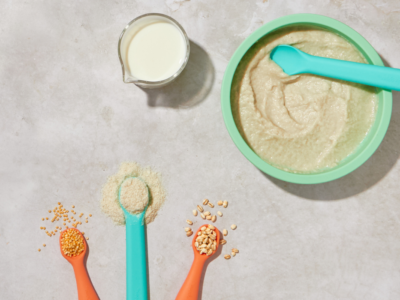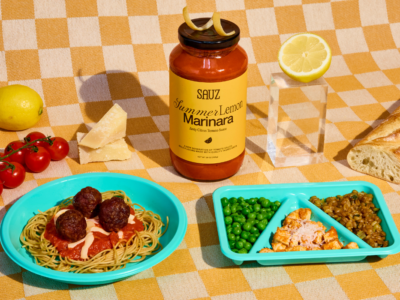A plant-based diet is all the rage these days and indeed, it can provide a lot of benefits for your child and yourself. According to the American Dietetics Association, “appropriately planned vegetarian diets, including total vegetarian or vegan diets, are healthful, nutritionally adequate, and may provide health benefits in the prevention and treatment of certain diseases.”
What does “well-planned” mean, however? If you’re considering a plant-based approach with your kiddo, here are 8 tips to help your child thrive on a plant-based diet.
Opt for healthy fats.
Make sure to include healthy sources of fats especially for children under 12 months of age. Nut + seed butters, tahini, avocado, coconut and certain high quality oils are your friends. Not only are they delicious and highly nutrient-rich, they also provide the satisfactory fullness after a big meal. A few of our favorite Little Spoon products high in healthy fats include the Tahini Banana Bread Smoothie and Cauli Croquettes Plate.
Offer foods high in iron.
Green leafy vegetables, beans, lentils, tofu, chia seeds, all kinds of seeds, raisins, dried apricots and quinoa are all good sources of iron for your little one. Nut and seed butters are great sources of iron too! Tip: pair your plant source of iron with a source of vitamin C for better absorption. Fruits and vegetables that are high in vitamin C include mango, pineapple, strawberries, raspberries, blueberries, citrus fruit, broccoli, bell peppers, spinach, potatoes, tomatoes—you name it. For foods that are high in both iron and vitamin C try Little Spoon’s Barley Vegetable Minestrone blend or Strawberry Banana Shake Smoothie.
Don’t forget about calcium.
Calcium is good for our bones but where do we get calcium without dairy? You might be surprised to find out that calcium is abundant in many plant-based foods. Go for tofu or tempeh, beans, lentils, peas, almonds, sesame seeds, chia and flax seeds as well as green leafy vegetables. Or simply choose a plant milk that your little one will enjoy. Many plant milks offer more calcium than cow’s milk.
Pack in the protein.
Protein is an important part of a diet, especially for our growing babies. It’s important to understand a proper daily protein requirement to ensure an adequate intake. On average, your little one needs 0.5g of protein per 1lb of weight. For example, if a child weighs 20lb they need ~10g of protein a day. It might sound like a lot, but it is quite easy to achieve actually. Try tofu + tempeh, beans + lentils, nuts + seeds, or whole grains. Plant milks made with soybeans or pea protein are good options as well. We love that Little Spoon offers great plant-based protein options such as the Blueberry Chickpea Spinach Pear Rosemary Babyblend, Black Bean + Farro Cubano Bowl and Broccoli Bites Plate.
You might have to supplement.
Vitamin B12 is one nutrient that cannot be naturally found in plant foods. It plays an important role in keeping our blood and nerve cells healthy. Make sure your child has a consistent source of this crucial vitamin whether it is from fortified foods or from a supplement. Talk to your pediatrician to learn more.
Eat the rainbow.
Don’t stress too much about individual nutrients. As long as you offer your child a variety of colorful fruits and vegetables as well as whole grains, protein and fat, they’ll be thriving.
Don’t fear carbs.
For those of us who grew up surrounded by the diet culture of the 90s and 2000s, carbs got a pretty bad rap. Carbs are our bodies’ preferred source of sustainable energy and our children need lots of it. That being said, there is a big difference between that and a short-term sugar rush that is usually caused by foods such as white bread, pastries, soda, sweets and many snacks with added sugar. Instead of refined sugars and flours, opt for whole grains and starchy vegetables: potatoes, sweet potatoes, whole grain pasta, oatmeal, quinoa, rice, buckwheat, and legumes.
Cook as a family, eat as a family.
Children learn by example. If you eat lots of healthy plants, so will they. It might not happen right away especially if they’ve already been exposed to a different type of a diet. Keep offering even if a child refuses at first (or second, or even tenth time), keep modeling a good example, remove stress and pressure from the situation, and the results will come. Learning healthy food habits is a marathon, not a sprint. It’ll take time to achieve lifelong benefits. Let your little help out with cooking—they’re a lot more likely to eat what they made themselves.



